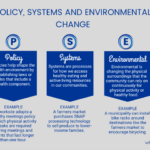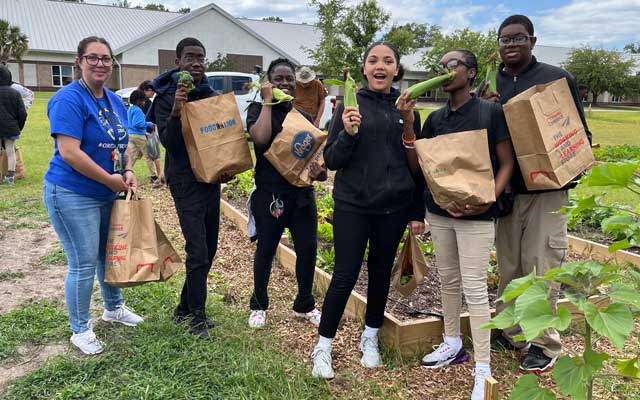
Clearing a path to agricultural careers with a school-based community garden
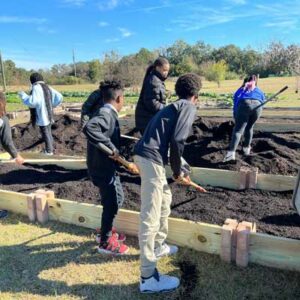
Returning to your roots seems to be a recurring theme for many Wholespire Healthy Eating and Active Living Mini-Grant recipients. But that’s no surprise for those of us who were raised in rural communities. There’s something special about growing up in a small town that instills values like feeling a strong sense of community, trust, responsibility, and civic engagement, to name a few.
In Northern Beaufort County, there’s a close-knit community that goes back generations and has a long history in farming and agriculture. Whale Branch, or Seabrook, comprises low-income and food-insecure families. If you’ve ever taken a road trip to Beaufort, you’ve driven through the area and probably noticed farms, marshes, creeks and rivers. If you live close by, you’ve most likely gone there to buy fresh oysters, shrimp or blue crabs or to pick tomatoes or strawberries.
Farming and agriculture are disappearing there, thanks to land development. However, a local nonprofit composed of local farmers and descendants is trying to change that while feeding the community and empowering youth through a community garden at Whale Branch Middle School. Some may tell you it’s turning into more of a farm.
Connecting the past to the present
Heritage Community Farm (HCF) isn’t a farm, as the name might imply. It’s a nonprofit started by local volunteers to identify underutilized land in Beaufort County and develop community gardens for food security, education, economic opportunity, conservation and preservation. HCF President Catherine Isbell and some local farmers and businesspeople were inspired to create the nonprofit after attending a Clemson Extension leadership program. Initially, they focused on developing mini-farms, but realizing the infrastructure cost would be too much for a startup nonprofit, they decided to focus on community gardens.
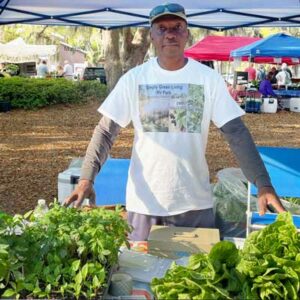
Isbell, a former educator, explained they had identified Whale Branch Middle School as a partner because the campus, which is also home to Whale Branch Elementary School, had an unused greenhouse and the space for gardens. “And that’s how we changed from sort of a farm aspect to a community/education garden, and we’re almost farming now, aren’t we?”
According to the website, HCF Vice Chair Roy Green was raised on a farm and was taught at an early age the importance of growing your own fresh produce. He began farming alongside his mother and father at the age of five. He completed the South Carolina Master Gardner program through Clemson Cooperative Extension and shares a passion for growing vegetables.
“Yeah, yeah, I know a thing about farming. I have a rich heritage in farming,” explains Roy Green, vice chair of HCF. “My parents were farmers; coincidentally, my mom and dad grew up in that area. When there wasn’t a school there, it was farmland, so it all worked out that we could use that area…and working with youth, they can make the connection on what’s going on, tell their parents and grandparents about it and learn from them that they used to farm that land.”
HCF and Whale Branch Middle School started small and built on their successes one step at a time. From a few garden beds in disarray to multiple raised garden beds and a large, plowed field, the students are reaping the rewards in the classroom as the crops are shared within the community. And we’re not talking a little here or there. We’re talking about an abundance of produce shared year-round. HCF has managed to grow its volunteer base, get students involved outside the classroom, and keep their community garden project growing and thriving even when school is not in session.
Youth empowerment through education
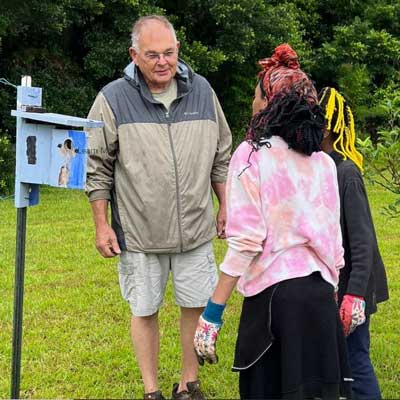
A lot of work is involved in a large project like the community garden/farm at Whale Branch Middle School, but the students get more out of the work than they might realize. They are getting hands-on experience and relating it to science and math in an outdoor classroom environment. They are gaining valuable knowledge and skills in farming, agriculture and life, and some teachers are too.
“We do have a few teachers who consider themselves to have green thumbs, but we have a specific teacher who absolutely hates going outside,” says Jamie Allen, principal of Whale Branch Middle School. “By the end of the school year, she was wondering if her name was going to be on the schedule for her class to go out and either harvest or assist with planting, and so it has just taken on a whole life of its own, and people are excited.”
The teachers are receptive to using the garden as a teaching tool. Principal Allen says, “Some teachers have used it more so in conjunction with math. The science teachers have been using it for photosynthesis and the natural processes from seed to plant to table. So, sometimes it’s been content related, other times it’s just been life skills.”
Middle school is a time of transition for many 11- to 14-year-olds. They’re experiencing many changes, physically, cognitively and emotionally. They exhibit a wide range of characteristics as they navigate the transition from childhood to adolescence. Principal Allen says some students go into the garden with mixed feelings, but in the end, they love it.
“I have middle schoolers who are moody sometimes, and they don’t think they want to do it, or they don’t want other people to know that they think it’s cool. So, they might come out there grumbling and then arguing because they didn’t get a shovel or they want to plant some more seeds, but their experience oftentimes is, oh my gosh, we planted this and look what we’re pulling out of the ground. Harvesting and planting are definitely a highlight for the kids.”
Working with students and doing something good has many rewards for the volunteers. Ernie Wiggers, HCF chair, says, “It’s a lot of fun. It’s rewarding. You know, working in your garden. It’s great to work with young people and hear them talking about how their mom or grandmother cooks with certain products and stuff, and so I think it’s a nice addition to their educational experience, that’s for sure.”
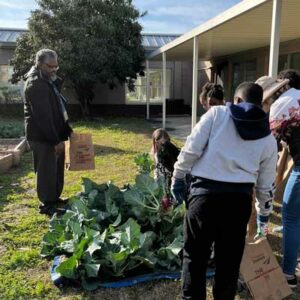
The power of funding and donors
HCF has been working with Whale Branch Middle School for only a couple of years, yet they’ve already achieved great success with the help of funders, students, and community volunteers.
“The past year and in large part due to the grant that we got from Wholespire, it’s just been a year of tremendous growth for us. The grant provided us with funds to build four additional raised beds. We were able to shift some money that had been granted into other projects because we had donations that came through,” says Isbell. “As things expanded, so did our volunteer list. Working with Principal Allen and teachers has helped us coordinate the days that the kids come out and work with the volunteers.”
One of their secret weapons is the military. Beaufort is home to three military bases: Parris Island Marine Corps Base, Marine Corps Air Station and the Naval Hospital. Military personnel often volunteer to help out.
Wiggers proudly says, “One of our big volunteer groups, when we really have something large going on, and we need a lot of people power, is the local military bases. The military encourages their men and women to do volunteer work. They will come out in large groups, and we get some big projects done on those days.”
To plant a seed is to believe in the future
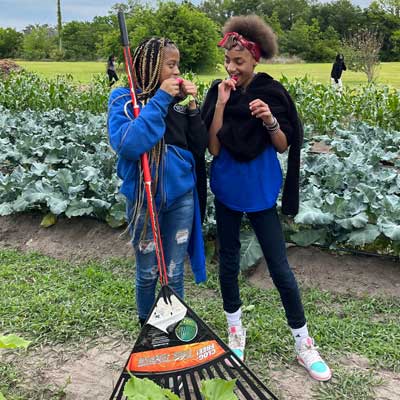
When asked what she hopes the students get from this experience in the long term, Principal Allen says, “To be able to live off of the land, to plant and harvest their own food, to see that we can actually do things besides going to the grocery store. There are actually a lot of careers out there that are aligned with agriculture, and, ultimately, I want them to be exposed to that. I want them to be able to take care of themselves in a future that we don’t know what it’ll look like and to be exposed to professional opportunities and to build a career out of it.”
Allen adds, “I believe that the impact on the students and the community will be much larger than we can imagine right now, you know, as our children grow and mature and have their own experiences. I do think it has a lifelong impact on the students who have gotten the opportunity to experience it.”
Perhaps a more important lesson for students is learning or being reminded that farming and agriculture are part of their heritage. Green reflects, “Where we grew up, farming was huge, and to see our kids learning more about how their parents and grandparents made a way, made their living with farming…and to hear Miss Allen say that now she can plant a garden because it’s not hard — it looks hard, but it’s not that hard. And if you put your mind to it and have the will and the labor to do it, you can do it.”
When people return to their roots, many take an interest in using their skills and knowledge to improve the quality of life for others to do something good. And that’s what’s happening at Whale Branch. Their desire for positive change can result in collaborative efforts and community development initiatives that make hometowns more vibrant, inclusive, and prosperous places to live.
As Principal Allen said, “We don’t know what the future holds. We want our children to be prepared for whatever there is to come in the future, and that does include agriculture.”
Visit the Heritage Community Farm Facebook page to see more!



